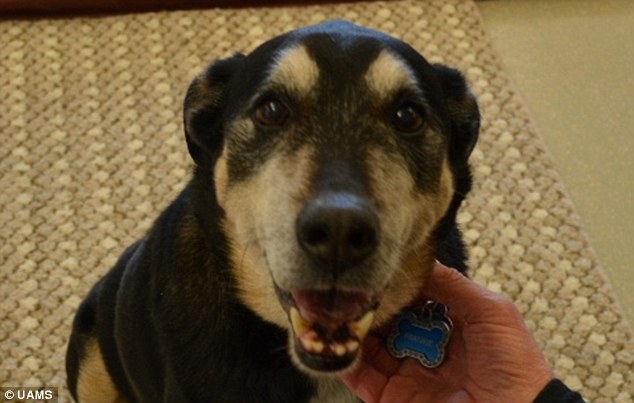|
Tests on 34 patients showed an 88% success rate in finding tumours. The team, presenting their findings at the annual meeting of the Endocrine Society, said the animal had an "unbelievable" sense of smell. Cancer Research UK said using dogs would be impractical, but discovering the chemicals the dogs can smell could lead to new tests. The thyroid is a gland in the neck that produces hormones to regulate metabolism. Thyroid tumors are relatively rare and are normally diagnosed by testing hormone levels in the blood and by using a needle to extract cells for testing. Smelly job Cancers are defective, out-of-control cells. They have their own unique chemistry and release "volatile organic compounds" into the body. The canine approach relies on dogs having 10 times the number of smell receptors as people and being able to pick out the unique smells being released by cancers. The man's best friend approach has already produced promising results in patients with bowel and lung cancers. A team at the University of Arkansas for Medical Sciences (UAMS) had previously showed that a dog could be trained to smell the difference between urine samples of patients with and without thyroid cancer. The next step was to see if it could be used as a diagnostic test. Frankie the German Shepherd was trained to lie down when he could smell thyroid cancer in a sample and turn away if the urine was clean. Thirty-four patients, who were going to hospital for conventional testing, took part in the trial. Frankie gave the correct diagnosis in 30 out of 34 cases. There were two false positives and two patients who would have been incorrectly given the all-clear. Dr Donald Bodenner, the chief of endocrine oncology at UAMS, said: "The capability of dogs to smell minute amounts is unbelievable. "The medical community over the next few years is going to have a great appreciation [for them]. E-nose Some researchers are trying to strip out the canine-element and test for the unique pong of cancer with an "electronic nose". This approach is also being trailed outside of cancer and has been used to find dangerous infections such as Clostridium difficile. Dr Bodenner added: "We would like to know what Frankie is smelling, nobody knows." Commenting on the findings Dr Jason Wexler, an endocrinologist in Washington, DC, argued: "This is a fascinating, interesting study and it has high potential in areas of the world that may not have access to biopsy techniques. "There are many patients who are reluctant to undergo fine needle aspiration so I think that if you could design a technique where you have no invasive procedure that can have tremendous widespread appeal." But Dr Emma Smith, from Cancer Research UK, cautioned: "Although there's some evidence that some trained dogs can sniff out the smelly molecules given off by cancers, there have been mixed results on how accurate they are and it's not really practical to think about using dogs on a wide scale to detect the disease. "But carrying out lab tests to understand what the dogs are smelling might help to inform the development of 'electronic noses' to detect the same molecules, which could lead to better diagnostic tests in the future." Dr Bodenner says it is an approach that he is actively pursuing. Meanwhile, the lab is also trying to find a new home for canine-veterans from Iraq and Afghanistan. Instead of sniffing out bombs, they will be trained to hunt for cancer. Source: BBC News A Peaceful Farewell provides compassionate at home pet euthanasia to fellow pet owners in Chandler, Gilbert, Mesa, Tempe, Ahwatukee, Scottsdale, and most of the Greater Phoenix Metropolitan Area.
0 Comments
Leave a Reply. |
The PAW Blog...
For the LOVE of Pets The goal of this blog is to help educate pet owners by sharing pet health facts and pet news articles...and ... sometimes put a smile on your face with a cute or funny pet story! Categories
All
Archives
July 2024
Search for any topic...
|


 RSS Feed
RSS Feed

